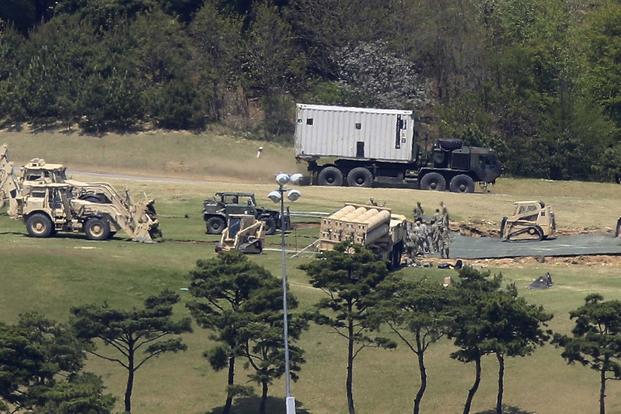A U.S. senator blasted the South Korean government's delay in accepting a missile-defense system and questioned Army leaders why the vulnerable Pacific country would have second thoughts about the nearly $1 billion American investment.
"Something that I thought was agreed to over a period of two years is now going to be actively debated in the assembly of South Korea to determine whether or not they will accept our expenditure of $923 million for a missile defense system," Sen. Richard Durbin, D-Illinois, said Wednesday during a Senate Appropriations Committee hearing.
Durbin's comments came the same day South Korean President Moon Jae-in's office called for the suspension of the Terminal High Altitude Area Defense, or THAAD, system pending an environmental impact assessment that could take more than a year.
"This THAAD missile defense system for medium-range missiles seems so obvious to me for the people living in South Korea to protect them and to protect our forces ... I am troubled by the fact that it is now going to be resubmitted for political debate in the Republic of Korea," Durbin said.
Related stories:
- South Korean President Calls for THAAD Deployment to Be Suspended
- THAAD Goes Operational in South Korea
- China Warns That South Korea Will 'Pay the Price' if THAAD Is Deployed
He asked both Acting Secretary of the Army Robert Speer and Army Chief of Staff Gen. Mark Milley for their insight on the issue and if the South Korean government has shown any change of attitude toward its relationship with the United States.
Speer said he had not spoken to South Korean leaders, but said he believes "the relationship is going well," and that two THAAD batteries are "up and operational."
The South Korean presidency stressed it wasn't calling for the withdrawal of two launchers and other equipment already positioned on a designated site in a remote southeastern area. The launchers and radar for THAAD were deployed in the Seongju area in an overnight operation that critics said was aimed at getting it into place before May 9 snap elections that ushered Moon into office.
The government also has launched an investigation into whether the country's defense ministry kept secret the delivery of four additional launchers and sought to make the program appear smaller to legally avoid an all-out environmental impact evaluation.
Milley told Durbin that he regularly interacts with his counterpart in South Korea and assured him that "we will work through that. As I understand the issue ... it has to do with environmental concerns and the placement" of the system.
"The THAAD is essential to protect U.S. forces in Korea but also South Korea as a whole," he said.
Durbin said the point raised by the South Korean president "was two-fold -- environmental and the second one what he called due process, namely that his assembly would need to debate whether or not to go forward with this missile-defense system."
Meanwhile, North Korea fired several suspected short-range anti-ship missiles Thursday, South Korea's military said, in a continuation of defiant launches as it seeks to build a nuclear missile capable of reaching the continental United States.
The projectiles were fired from the eastern coastal town of Wonsan and likely flew about 200 kilometers (about 125 miles) while reaching a maximum altitude of about 2 kilometers (1.2 miles), South Korea's Joint Chiefs of Staff said.
They landed in waters between the Korean Peninsula and Japan, where the U.S. aircraft carriers USS Carl Vinson and USS Ronald Reagan participated in joint exercises with the South Korean navy that ended earlier this week.
"I can't follow their logic here," Durbin said. "I would think, if I lived in the Republic of Korea, I would want every missile defense system available."









